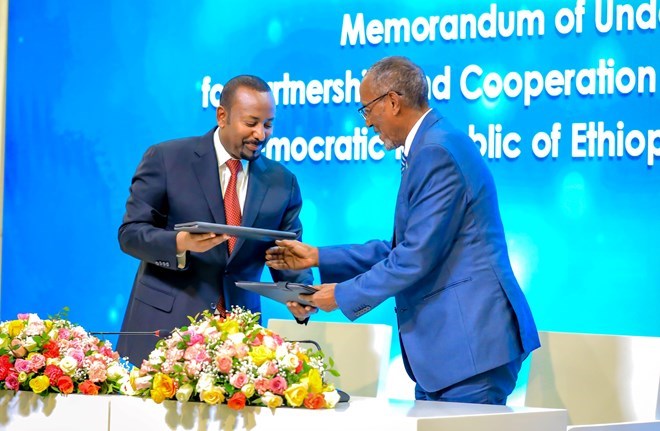
Monday February 12, 2024

Somaliland's President Muse Bihi Abdi and Ethiopia's Prime Minister Abiy Ahmed signed an agreement. Ethiopia now formally acknowledges Somaliland as a separate nation, and in return, Somaliland allows Ethiopia to use its ports and waters for naval and commercial purposes for the next 50 years.ENA
Hargeisa (HOL) - Following Somalia's Ministry of Foreign Affairs' denunciation of the Somaliland-Ethiopia Memorandum of Understanding (MoU) between Somaliland and Ethiopia as a sovereignty violation and regional peace threat, Somaliland has countered these allegations. The self-declared autonomous region emphasized that the agreement with Ethiopia is built on mutual respect and shared goals for regional stability.
According to a press release from the Somaliland Government dated February 11, the critique from Somalia regarding the MoU as unlawful is firmly rejected by Hargeisa, labelling it an overt breach of international norms and an infringement on its people's right to self-determination.
The discord stems from the MoU signed on New Year's Day, which irked Somalia by potentially enabling Ethiopia to establish a naval base on the Somaliland coast. Somaliland's Ministry of Foreign Affairs underlined the pact's importance in maintaining territorial integrity and fostering peaceful coexistence and regional cooperation. "We urge Somalia to abandon its outdated claims and respect the aspirations and future prospects of millions of Somalilanders," the statement said, calling for acknowledgment and respect from its neighbor.
Somaliland, declaring its independence, underlines the constitutional foundation approved by its citizens in 2001, guiding its democratic elections and governance. "The legitimately elected government has complete authority to engage in agreements or treaties with any state or entity, subject to final approval by the people's representatives," Somaliland asserted, dismissing any doubts about its foreign dealings' legitimacy.
In response to Somalia's reference to non-participatory documents, Somaliland clarified, "Somaliland has NEVER been a signatory to the documents mentioned in Somalia's press release," condemning the accusations as unfounded.
Somalia has labelled the agreement "null and void," arguing that it contradicts its national constitution, which disallows regional administrations from autonomously entering foreign agreements.
Viewing the MoU with Ethiopia as a stride toward legitimizing its autonomy, Somaliland's stance contrasts with Somalia's perception of the agreement as a sovereignty infringement and a setback to its progress, including anti-terrorism efforts and milestones like debt relief and lifting of the UN arms embargo.
Somaliland called for cooperation and dialogue to ensure a peaceful outcome; however, the dispute over the Ethiopia MoU presents a considerable challenge to regional diplomacy and stability. The international community, including the United States, the European Union, and the African Union, has voiced concern over the rising tensions.